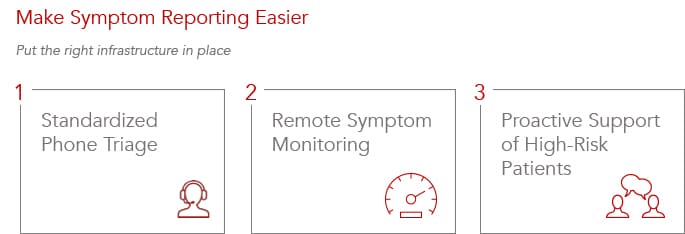 The Advisory Board’s Oncology Roundtable national meeting will be held in August. At the meeting they will be looking at market forces impacting oncology, tactics to position cancer program for success in value-based programs.
The Advisory Board’s Oncology Roundtable national meeting will be held in August. At the meeting they will be looking at market forces impacting oncology, tactics to position cancer program for success in value-based programs.
One session at the meeting entitled “The Cancer Care Transformation Playbook” will look at opportunities to reduce costs and improve care. The presentation (membership is required to view it) identifies the key strategies to do that including reducing avoidable emergency department and hospital use and a key tactic to achieve that is encouraging patients to report symptoms. The Advisory Board highlights Navigating Cancer technology and one of our strategic clinical partners, the Center for Cancer and Blood Disorders (CCBD), to demonstrate some effective strategies to deliver more proactive care to cancer patients.
Strategies to Encourage Patients to Report Symptoms:
- Standardized phone triage. In an effort to transform their practice for value-based care, CCBD implemented a centralized phone triage system with two dedicated triage nurses to better manage urgent symptoms and keep cancer patients out of the ED. They partnered with Navigating Cancer to create a workboard and standardized pathways so that patient issues could be efficiently and consistently managed. CCBD measured phone triage line call volume, the speed of symptom management and same-day appointments scheduled as a result of a call and they estimate that their new triage system has saved them more than $400,000 in one month.
- Remote symptom monitoring. Together with CCBD, we also created Health Tracker, a mobile app for monitoring oral adherence and side effects. The Navigating Cancer software compiles patient-reported data prioritized according to symptom severity into a workboard for triage nurses. This enables nurses to address to most severe patient issues right when they arise. We are currently in the process of measuring the impact of this program, but there is growing evidence that giving patients an easy way to report on symptoms not only impacts the patient experience, but can also impact survival.
If you are looking for strategies to reduce avoidable hospitalizations and deliver more proactive care, learn more about our patient relationship management solution.

